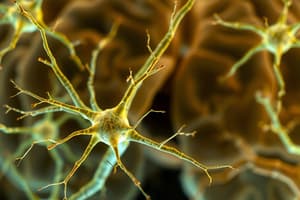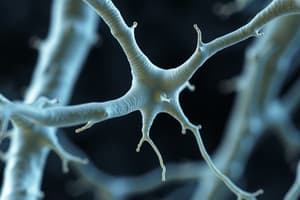Podcast
Questions and Answers
What is neuroscience?
What is neuroscience?
The science of the brain.
Which of the following are considered parts of the nervous system? (Select all that apply)
Which of the following are considered parts of the nervous system? (Select all that apply)
- Dyslexia
- Chemical Messengers (correct)
- Neurons (correct)
- Plasticity (correct)
The brain weighs about 1.5 kg.
The brain weighs about 1.5 kg.
True (A)
What is neuronal plasticity thought to underlie?
What is neuronal plasticity thought to underlie?
The brain can see and ___ pain.
The brain can see and ___ pain.
Which of the following techniques are mentioned as changing modern neuroscience? (Select all that apply)
Which of the following techniques are mentioned as changing modern neuroscience? (Select all that apply)
What can happen when one or more genes involved in brain development go wrong?
What can happen when one or more genes involved in brain development go wrong?
What is neuroscience?
What is neuroscience?
What are the building blocks of the brain?
What are the building blocks of the brain?
The human brain is the most complex organ in the body.
The human brain is the most complex organ in the body.
What is neuronal plasticity?
What is neuronal plasticity?
Which of the following is a condition that can develop when genes go wrong?
Which of the following is a condition that can develop when genes go wrong?
The brain weighs about ____ kg.
The brain weighs about ____ kg.
What role do chemical messengers play in the brain?
What role do chemical messengers play in the brain?
What is the importance of sleep for the brain?
What is the importance of sleep for the brain?
The brain does not develop gradually.
The brain does not develop gradually.
Flashcards are hidden until you start studying
Study Notes
Introduction to Neuroscience
- Neuroscience is the study of the brain.
- The brain is the most complex organ in the body.
- It weighs approximately 1.5 kg.
- It allows us to sense the world, think, and talk.
- It's composed of billions of tiny cells called neurons.
The Nervous System
- The nervous system is a complex network of neurons that work together.
- It's responsible for sending and receiving information throughout the body.
Neurons and the Action Potential
- Neurons are the building blocks of the brain.
- They communicate with each other through electrical and chemical signals.
- The electrical signal that travels along a neuron is called an action potential.
Chemical Messengers
- Neurons communicate with each other using chemical messengers called neurotransmitters.
- Neurotransmitters are released from one neuron and bind to receptors on another neuron.
Drugs and the Brain
- Drugs can affect the brain by altering the way neurons communicate.
- Some drugs can mimic neurotransmitters, while others block their effects.
- Drug use can have serious consequences for brain health.
Touch and Pain
- The brain processes information from our senses, including touch and pain.
- Different areas of the brain are responsible for processing different types of sensory information.
Vision
- Vision is a complex process that involves the eyes, brain, and nervous system.
- The eyes detect light and send signals to the brain.
- The brain interprets those signals and creates our perception of the world.
Movement
- The brain coordinates movements through a complex network of neurons.
- Different areas of the brain are responsible for planning, initiating, and executing movements.
The Developing Nervous System
- The brain develops gradually throughout childhood and adolescence.
- The connections between neurons are constantly changing and being refined.
Dyslexia
- Dyslexia is a learning disorder that affects reading ability.
- It can be caused by differences in the way the brain processes language.
Plasticity
- Neuronal plasticity is the brain's ability to change and adapt.
- This process is essential for learning, memory, and recovery from brain injury.
Learning and Memory
- Learning is a process of acquiring new knowledge and skills.
- Memory is the ability to store and retrieve information.
- The brain uses plasticity to store memories and learn new information.
Stress
- Stress is a natural response to challenging situations.
- It can be triggered by physical or psychological stressors.
- The brain releases hormones like cortisol and adrenaline that prepare the body for action in response to stress.
The Immune System
- The brain is a complex part of the immune system.
- Specialized cells in the brain help to protect against infections and diseases.
Sleep
- Sleep is essential for brain health.
- During sleep, the brain consolidates memories, repairs itself, and prepares for the next day.
Brain Imaging
- Brain imaging techniques allow scientists to study the structure and function of the brain.
- These techniques include magnetic resonance imaging (MRI) and functional magnetic resonance imaging (fMRI).
Artificial Brains and Neural Networks
- Scientists are developing artificial neural networks to simulate the brain's functions.
- These networks can learn and solve problems like the human brain.
When Things Go Wrong
- The brain can be affected by diseases, injuries, and other factors.
- Some common brain disorders include Alzheimer's disease, Parkinson's disease, and stroke.
Neuroethics
- Neuroethics is the study of ethical issues related to neuroscience research and technology.
- It considers the potential risks and benefits of new brain technologies.
Training and Careers
- There are many different career paths in neuroscience.
- Scientists, researchers, doctors, and therapists all contribute to understanding and treating brain disorders.
Further Reading and Acknowledgements
- There are many resources available to learn more about neuroscience.
- The Neuroscience Community at the University of Edinburgh is a valuable source of information.
Neuroscience: Introduction
- The human brain is the most complex organ, weighing approximately 1.5 kg
- The brain is responsible for sensation, thought, and communication
- Neuroscience is the study of the brain, encompassing various scientific disciplines like molecular biology, experimental psychology, anatomy, physiology, and pharmacology
Nervous System
- The nervous system is composed of billions of nerve cells
- The nervous system is responsible for controlling and coordinating bodily functions
Neurons and the Action Potential
- Neurons are nerve cells that transmit information
- The action potential is an electrical signal transmitted along a neuron
Chemical Messengers
- Chemical messengers are molecules that transmit signals between neurons
- Neurotransmitters are chemical messengers that are released into the synapse, which is a small gap between neurons
Drugs & the Brain
- Drugs can impact the brain by interfering with the release of neurotransmitters
- Drugs can also impact the brain by binding to receptors on neurons
- Drugs can have both positive and negative effects on the brain
Touch and Pain
- Touch and pain are both sensory experiences transmitted to the brain through the nervous system
- Pain is a warning signal that helps the body avoid harm
Vision
- The eyes receive light and convert it into electrical signals
- These electrical signals are then transmitted to the brain, where they are interpreted as images
Movement
- The brain controls voluntary movement through a complex system of neural pathways
- The brain also controls involuntary movement through a different system of neural pathways
- Brain regions associated with movement include the motor cortex, basal ganglia, and cerebellum
Development of the Nervous System
- The brain develops gradually and is influenced by genes
- Alterations in genes can lead to conditions such as dyslexia
Brain Plasticity
- The brain is plastic, meaning it can change and adapt over time
- Neuronal plasticity refers to the ability of the brain to form new connections between neurons
- Brain plasticity is thought to underlie learning and memory
Learning & Memory
- Memory involves strengthening connections between neurons
- Memory is a complex process that involves multiple brain regions
Stress
- Stress can have both positive and negative effects on the brain
- Chronic stress can damage the brain
Immune System
- The brain is connected to the immune system
- The immune system can impact brain function
Sleep
- Sleep is essential for brain health
- Sleep allows the brain to rest and repair itself
- Sleep deprivation can have negative effects on brain function
Brain Imaging
- Brain imaging techniques, such as magnetic resonance imaging (MRI), allow scientists to study the structure and function of the brain
Artificial Brains & Neural Networks
- Scientists are working to create artificial brains using technology like silicon chips
- These artificial brains are based on the structure and function of the human brain
When Things Go Wrong
- The brain can become diseased or injured
- Common brain disorders include Alzheimer's disease, Parkinson's disease, and stroke
Neuroethics
- Neuroethics is the study of the ethical implications of brain research
- Neuroethics addresses issues like consent, privacy, and the potential for misuse of brain research findings.
Training & Careers
- A career in neuroscience involves studying the brain and its functions
- Training in neuroscience can involve advanced degrees in fields like biology, psychology, medicine, or engineering
Further Reading & Acknowledgements
- The booklet is a guide for young students and provides information on the science of the brain
Studying That Suits You
Use AI to generate personalized quizzes and flashcards to suit your learning preferences.



